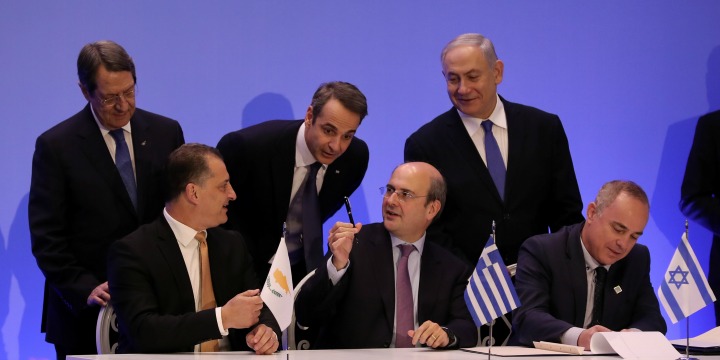Plans to connect Israel, Cyprus and Greece with a 2,000 megawatt undersea electricity cable took a key step forward on Monday, when the three countries signed an agreement to speed up technical work on the project.
Cypriot Energy Minister, Natasa Pilides, hosted a ceremony in the capital Nicosia on Monday with her Israeli counterpart, Yuval Steinitz, and Greek Minister, Kostas Krekas, participating via online link.
Pilides said that with the signing of the Memorandum of Understanding, the three ministers agreed on the need to expedite permits and approvals to conduct feasibility studies and to coordinate with their respective national electricity regulators on how best to proceed.
READ MORE: Greece, Israel and Cyprus to sign EastMed agreement.

Pilides said the deal boosts cooperation “in supporting the planning, potential development and implementation of the EuroAsia Interconnector, as an additional element of the emerging Eastern Mediterranean Energy Corridor.”
Pilides called the project a “cornerstone” of the countries’ efforts to transition to a green economy that will protect the environment while promoting economic growth.
She said the cable will help the three countries meet their commitments under the Paris Agreement on Climate Change, which aims to limit carbon emissions, while helping to diversify the energy supply of fossil fuel-dependent Cyprus.
READ MORE: Greece and Israel Foreign Minister’s “eye to eye” on military cooperations.
The project’s first phase is expected to be operational by 2025.

The European Union’s executive Commission has said the cable is a “key project of common interest” that makes it eligible for EU financing.
Pilides said some of the project’s additional benefits include enhancing energy supply security and allowing the three countries to be potential energy exporters.
READ MORE: Greece and Israel complete historic $1.68 billion defence agreement.
Cyprus is working on a separate deal with Greece and Egypt on a similar cable connecting the three countries.
Israel, Cyprus and Greece have also teamed up for a planned $6 billion undersea pipeline to carry gas from new offshore deposits in the southeastern Mediterranean to continental Europe.
Source: AP News.
